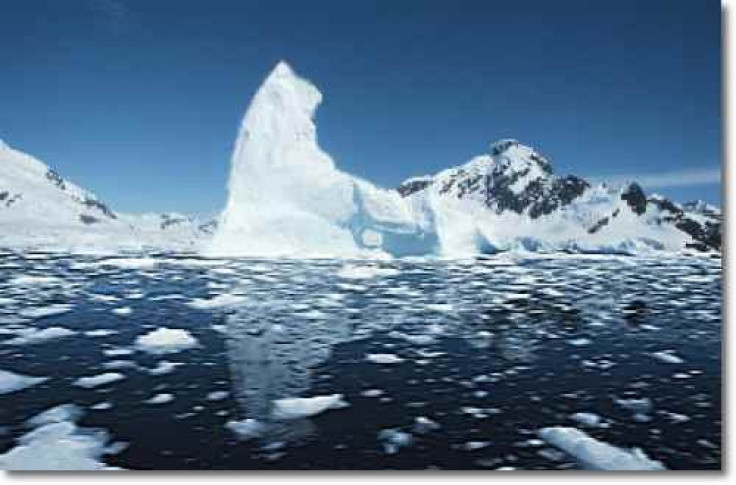Climate Change Deniers Tend To Embrace Free Market, Conspiracy Theories, Study Finds
ANALYSIS

What do some conspiracy theorists and free market ideologues have in common? They both deny climate change, according to a recent psychological study conducted out of the University of Western Australia.
The study titled, "NASA faked the moon landing -- Therefore (Climate) Science is a Hoax," analyzes the logic (or lack thereof) and motivations behind the denial of the overwhelming scientific evidence that supports the theory of anthropogenic (human-generated) climate change.
Researchers conducted an online questionnaire to determine respondents' viewpoints on climate change, other scientific theories, free market economics and various conspiracy theories.
It was posted to eight different blogs covering climate change, which researchers disclosed were "pro-science" but had a "diverse audience." Attempts to have the questionnaire posted to five different climate change "skeptic" blogs were denied. Over 1,000 responses were compiled.
What the study found was that climate change deniers tend to fall into one of two main camps: those who strongly advocate for free market economic liberalism and those who are inclined to engage in conspiratorial thinking, more accurately referred to as "conspiracist ideation," believing in such theories that the 1969 Apollo moon landing was faked or that the U.S. government was behind the Sept. 11 terrorist attacks.
A third camp, those who believe that climate change issues have already been addressed, was also mentioned, though given much less emphasis.
"There is little doubt that people's personal ideology -- also often referred to as worldview or cultural cognition -- is a major predictor of the rejection of climate science," the study reads.
"Rejection of science must be distinguished from true skepticism, which may prompt the revision of a scientific claim on the basis of evidence and reasoned theorizing."
While laissez-faire capitalism is a distinct ideology typically associated with right-wing politics, conspiracist ideation tends to proliferate along the political fringes of both the far-right and the radical left, where some conspiracy theories are embraced and others rejected.
Nevertheless, the study draws a correlation between the acceptance of any such theories and the rejection of verified scientific research.
"[T]his finding suggests that a general propensity to endorse any of a number of conspiracy theories predisposes people to reject entirely unrelated scientific facts," the study added
The study also points out, however, that conspiracy theorists, comprised of disparate and fragmented groups of people, have far less social currency to influence public opinion on climate change than do free market ideologues.
"We suggest that free market ideology was more important for climate science than conspiratorial thinking for two reasons: First, climate science has arguably become more politicized than other sciences, and second, given the fundamental importance of fossil fuels (and hence CO2 emissions) to contemporary economies, climate science presents a far greater threat to laissez-faire economics," the study noted.
Although members of both groups (again, "conspiracy theorists" is a very broad umbrella category) may have different reasons for denying climate change, the conclusion the study draws is that the rationale of either group is not based on scientific evidence.
One of the main reasons for the perpetuation of climate change denial is the proliferation of bloggers, the study says.
"The internet ... provides opportunity for individuals who reject a scientific consensus to feed 'each other's feelings of persecution by a corrupt elite,'" the study reads.
"Accordingly, climate 'skeptic' blogs have become a major staging post for denial."
The data supporting evidence of anthropogenic climate change, however, is overwhelmingly accepted by the scientific community.
Most recently, physicist and former climate change skeptic Prof. Richard Muller, who founded of the Berkeley Earth Surface Temperature project, concluded that climate change can indeed be attributed to human activity.
"Our results show that the average temperature of the Earth's land has risen by 2.5F over the past 250 years, including an increase of 1.5 degrees over the most recent 50 years. Moreover, it appears likely that essentially all of this increase results from the human emission of greenhouse gases," Muller wrote in a recent opinion piece for the New York Times.
"We were not expecting this, but as scientists, it is our duty to let the evidence change our minds."
To further illustrate the seriousness of the climate change issue, a team led by researchers at Stockholm University has just discovered that the retreat of arctic permafrost in Siberia, a side effect of climate change, is releasing 10 times more greenhouse gases (formerly sequestered in the ground) into the atmosphere than had previously been estimated.
"This will have consequences for the temperatures all over the world," Dr. Bart von Dongen said.
The implication of the University of Western Australia research team's study is that the growing scientific evidence behind climate change has had little effect on the viewpoints of people who are already predisposed to believe that the research is biased.
Ultimately this logic is circular -- any evidence which serves to threaten a denier's pre-conceived notions of climate change through the presentation of scientific fact is considered evidence of a conspiracy or bias that is already presumed to exist by such viewpoints.
In short, there is no winning with climate change deniers. It is the true skeptics, those who are willing to have their viewpoints changed such as Prof. Muller, who can help shift public opinion toward greater acceptance of the reality of this impending environmental catastrophe.
The danger though is that climate skeptics can quickly become deniers once they buy into the message that all supporting scientific evidence is a hoax or part some vast conspiracy among academia designed to destroy free market policies and the oil-based economy that feed them.
The market and its dependency on fossil fuels will be regulated one way or another, whether by governments or by nature. The latter will be far more painful.
© Copyright IBTimes 2024. All rights reserved.











